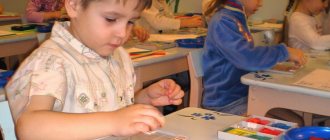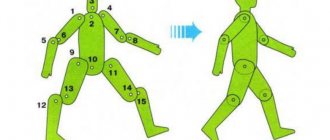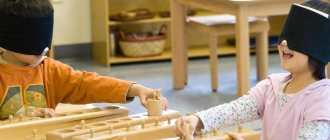In September 2021, changes appeared in the Education Law. Now education will give students not only knowledge and skills, but also instill moral and spiritual values that will become the basis of personality. To do this, teachers of educational institutions need to strengthen the educational part of the programs so that they meet the new requirements of the President. In the article we will discuss the essence of the requirements and how to implement them in kindergarten.
Federal Law No. 304-F dated July 31, 2020 caused a mixed reaction from educators. The question arose whether this situation applies to kindergartens, if the preschool program already includes educational work. It is even more difficult to single out purely educational moments, because they are closely related to educational ones. However, the law was introduced to place emphasis on the socialization and development of children in organizations, including kindergartens.
Changes in the law
The new federal law supplemented the previous law “On Education in the Russian Federation”. Briefly about the changes.
The concept of “education” has changed. In kindergarten, it is necessary to cultivate a sense of patriotism, a caring attitude towards nature, respect for the memory of the defenders of the Fatherland, for work and the older generation, for the laws and for oneself.
The definition of the educational program was specified. The program must include separate blocks of education and a calendar plan of educational work. The law allows organizations to independently develop the structure and content of the work program, therefore the pedagogical and parent councils of the kindergarten must work on the creation of modules.
We set deadlines for implementing changes. The law came into force on September 1, 2021, and by September 1, 2021, educational programs of kindergartens must already comply with this law. The state will verify compliance with the requirements during state accreditation.
They were required to tell parents about the changes.
Kindergarten staff should inform parents about the new curriculum focus.
On the one hand, these changes will make it possible to effectively combine educational processes in kindergarten and in the family. On the other hand, raising and educating children are inseparable, so there is no obvious point in separating the parenting plan into a separate document. However, state requirements cannot be ignored, because education has become a mandatory part of the educational program. Let's figure out how to implement innovations.
Becoming a social person
If we want our children to realize their potential as global citizens, then they will have to consider the other person's opinion without losing sight of their own point of view. Despite countless opposing and conflicting views, they need to be able to stick to their identity, their ideas, opinions, preferences and intentions. Being a social person means being able to cooperate, understand fairness and take into account the context in which they find themselves. These qualities underlie healthy moral development and the ability to use words to communicate your thoughts and feelings to others.
Since 3-4 year olds are in the process of forming their personality, becoming a social being is not yet relevant for them.
Individuality must come before community, so the focus of young children is usually on themselves. Sometimes parents of little ones may worry that their child is too self-centered, but this is nature's intention - they must first learn to understand themselves before being influenced by the many views and points of view of other people.
Their brains are still developing, so they often lack patience, and they understand justice as an opportunity to do things their own way. They do not interact well with others, and it is completely natural for them to prefer loneliness and disappear into the world of their own fantasy.
As a child approaches the ages of 8-11, he becomes increasingly able to understand irony and paradox.
They finally get the jokes, they understand the puns, and they can now be more patient when they feel frustrated. With ideal brain development, by this time they will be able to experience mixed feelings and take into account not only their own point of view, but also that of others. They can show signs of true cooperation and consideration, and are also capable of courageous actions. If development is on the right track, they will interact better with others and work to resolve problems and conflicts. They will demonstrate more balance and stability in the expression of emotions, as their ability to reflect and understand what is happening to them has increased.
When a child begins adolescence, it seems that he has taken a step back, become unpredictable and less emotionally stable. This occurs due to changes in the brain and due to increasing self-awareness, which can overwhelm them with emotions and new experiences.
By the age of 14-15, ideally, balance emerges and emotional stability returns. Teenagers must increasingly begin to see the world not through a single point of view, but be able to take into account a variety of events and problems. The development of moral judgment and awareness of themselves as part of a larger society will begin to creep in from time to time in their statements or ideals. Their capacity for courage will allow them to confidently move towards their goals.
By the end of adolescence, the child must become ready for life in society and able to benefit it.
Individuality cannot be taught or imposed on our children; it must be nurtured, cultivated, preserved and protected. Realization of personal potential depends on our ability to evolve into individual, adaptive, and social individuals. Each of us has the seeds of a mature future within us, but it takes time, patience, understanding and the right kind of care for them to sprout.
Carl Jung, a Swiss psychiatrist, had a great idea that growth can only be appreciated by looking back at it, not while it is happening. Our children have the prospect of a mature future for which the adults in their lives act as midwives.
Deborah McNamara Translation by Irina MatsenkoSource
Dear readers! To continue getting acquainted with the topic of unlocking personal potential, as well as to delve deeper into the topic, we suggest you read this collection of articles.
Gordon Neufeld on personal potential
About unlocking inner potential
About periods of development
How a child's personality is born
On the importance of rest for development
How to meet the new requirements
Federal laws do not indicate how to develop an educational program, so we will describe a rough plan.
Tell teachers and parents the details of the innovations
Teachers will have to develop certain qualities in children, so organize a teachers’ council and discuss the details of the new law. Educators must understand the main goal of the resolution - to educate a versatile and responsible personality based on the spiritual and moral values of the peoples of the Russian Federation, historical and national-cultural traditions.
Parents of preschoolers should be aware of all changes in educational activities; familiarize them with the new provisions. To do this, post information on the kindergarten website, information stands, prepare a presentation and tell them at a parent meeting how teachers will carry out educational work. Inform the parent committee that it can participate in the creation of the educational program.
Assign a group to create an educational plan
The manager must issue an order and approve the regulations on the work of the initiative group. It can include teachers and parents of students. Organize work meetings for them to work together.
The initiative group will have to study the educational program of the kindergarten and highlight educational aspects in it, and then think through the structure of the educational program, which will correspond to the main program of the kindergarten. To distribute the load and avoid burnout due to increased workload, assign people responsible who will develop individual program components by a specific deadline.
As a result of this work, the initiative group must present to the team a draft program with recommendations for introducing new educational tasks into the work programs of teachers of different age groups.
Stages of personality formation in preschool age
The formation of personality implies the development of cognitive processes and moral qualities, the formation of a worldview and self-awareness, the development of independence in activity and social activity. This is not a complete list of those features that characterize a person’s personality, but they are the main driving forces in the formation of a child’s personality.
The listed components are laid in preschool age. The active start can be considered 3 years of age, when the child’s self awakens. By the beginning of schooling, personality formation goes through two important stages that contribute to the development of basic age-related characteristics:
- Stage of becoming independent
- Stage of formation of personal initiative.
The first stage of a preschooler’s personal development is aimed at gradually reducing physical dependence on an adult and acquiring independence. The baby repeatedly announces to his parents and grandmothers his need to act on his own. “I myself” sounds in those activities that are interesting to the baby.
The child tries his best. Such an understandable action as folding toys does not interest the baby at all, since it is understandable and feasible. But pouring soup into a plate using a ladle or pinning a pin on a blouse is incredibly exciting!
The second stage involves a transition from the choice that an adult offers the child to the manifestation of one’s own initiative. This is a significant expansion of the boundaries of development. “I want to put together this construction set model,” “I will also water the flowers,” “You know what game I came up with...” - the initiative of older preschoolers extends to all types of activities.
At these stages of a preschooler’s personal development, numerous changes occur. Moral judgments and criteria are developed: what is possible, what is not, what is good and what is bad. Emotional and volitional qualities develop. But in the sphere of personality development, the main achievement of preschool age is independence and initiative.
Personal developments of preschool age
Let us consider in more detail what new formations are formed in the personal development of younger preschoolers, and then in older preschool age.
Changes are especially noticeable during critical age periods. There are two of them in preschool childhood: the 3-year-old crisis, which replaces early childhood with preschool, and the 7-year-old crisis, which precedes the school period.
The child is persistent in order to be allowed to do a certain action on his own. Having received the consent of the elders, the child most often faces a new obstacle - the matter cannot be argued! The button doesn’t fit into the buttonhole, the bag doesn’t rise, the tower of cubes falls apart...
The difficult task ahead is not to give up, but to try again and again until it succeeds. Therefore, such new formations as independence and will appear at the same stage of personal development.
For many children, it is easier to show initiative than determination. This quality is cultivated if adults encourage the cognitive activity of a preschooler. The child became interested in how a sprout emerges from a seed and took the initiative to plant it next to a houseplant. But then you need to water regularly and wait patiently for the sprout to hatch.
In such situations, the preschooler more often needs support in order to keep the goal in the field of his attention and interest. The child needs the same support if actions are unsuccessful.
Along with initiative, it is very important for adults to support the child’s desire for a goal, since this is a valuable personal quality.
Becoming a separate person
As an individual, the child must move towards increasing independence and responsibility for his decisions. He should develop a sense of control over his life, in which he confidently strives for his own goals and his own ideas. Realizing his potential as an individual means that the child sees himself as a unique being, he will rarely be bored, he will be full of vital energy and curiosity about what is happening in the world around him.
Signs of development into a separate personality in a 3-4 year old child will be the ability to play independently for short periods of time, as well as from time to time the expression of dissatisfaction with the restrictions and prohibitions imposed on him.
The more a child grows and forms his own intentions, the more frustrated he can become when those intentions encounter obstacles and the word “no.” Children at this age may show signs that they want to do things on their own, such as dressing themselves, potty training, and they are also willing to communicate their ideas and opinions about the world around us.
As a child reaches middle childhood, from 8 to 11 years old, he will develop more specific preferences and ideas about what he likes and who he is.
Children at this age may develop special interests and may become committed to certain activities. Ideally, they will be able to take more responsibility in household chores and complete their homework with only a little guidance. They will enjoy having more freedom and being able to communicate their ideas to those they trust.
Teenagers aged 14-15 who are developing as individuals will ideally be able to be alone and fill their time with creative activities such as drawing, writing, music or physical activity.
They should be able to set goals and confidently move towards them, for example, strive to work harder to achieve better grades or master a musical instrument. They may be annoyed by friends who copy others or cheat to achieve success. The more a teenager goes through the process of becoming himself, the more he will push away other people's ideas in order to create space for his own. In short, they become allergic to coercion.
Incentive sphere
Preschool childhood is a key and very important period of personality development. It is now that the formation of the main motives that will encourage the child to activity takes place. What is its specificity?
Motives appear related to the fact that the child strives to join adult life, to become more like his parents or their friends, to live like them. Often such motives are intertwined with the game, so kids often have fun playing “Mothers and Daughters”, “Shop” and the like.
In addition, we highlight the following motives:
To be better than peers, a competitive element. Establishing and maintaining positive relationships with adults
It is extremely important for a child to be singled out, praised, and rejoiced at his achievements. Moral motives are obedience, helping others, the desire to somehow please them. The motives for learning are the acquisition of knowledge, skills and abilities. It is common for a preschooler not to wait for praise, but to make certain efforts to receive it
In addition, it is during this period that a hierarchy of motives arises, their subordination
It is common for a preschooler not to wait for praise, but to make some efforts to receive it. In addition, it is during this period that a hierarchy of motives arises, their subordination.
The influence of the family on the formation of the child’s character
The development of human character begins at an early age, when mom and dad develop certain rules of behavior in relation to their baby.
Psychologists are sure: it is the family that has a decisive influence on the formation of a child’s personality and strong character in a child. So, what do parents need to consider when raising children from the very first days of life?
Consider the baby's characteristics
You should not mold a baby into an ideal image of a successful and smart child. Be sure to take into account his individual characteristics and temperament, since they are what create a holistic personality.
The most important thing for parents is to focus their efforts on improving character strengths and mitigating weaknesses. Simply put, you cannot grow a strong leader out of a modest romantic.
2. Choose the appropriate parenting method
To help mothers and fathers, many early education methods have been developed, and many manuals have been written. You have heard all about them: these are the systems of Doman, Zaitsev, Nikitin, Cecile Lupan, Montessori and many others.
Each of these methods develops in children those character traits that are needed for a full social life. Of course, it is not necessary to use any one developmental methodology; you can add your own developments to it.
The main thing is not to compare the baby with other children, but to surround him with attention and affection.
Create a customized routine
Newborns and infants require a structured routine, which gives children peace of mind and self-confidence.
In fact, a child up to six months has not yet learned to be capricious; he tries to convey his needs to his mother through screams. And the nature of these requirements will depend on the child’s temperament.
Therefore, try to learn to predict the baby’s desires and determine the periods of his activity and sleep. The correct routine helps to take into account the characteristics of temperament and build character.
Teach by example
We have already said that children do not pay attention to long notations, but repeat after adults. That is why the child’s behavior depends on the parents and the relationships in the family. To develop a strong character in your child, teach him to achieve goals and encourage independence.
The most important thing is that your actions do not differ from your words. That is, start raising a baby... with yourself. This is the first step towards developing strong child character traits.
And yet, even if you are not satisfied with the characteristics of a child’s temperament and character, you should not strive to instantly eradicate these qualities.
Yes, the main personality traits are formed before the age of three, but with proper care and attention, their negative manifestations can be significantly reduced.
So, the character of children largely depends on their innate characteristics, the style of upbringing in the family, and the chosen developmental methodology. But the most important factor is the attitude of the parents towards the child. Under the guidance of a sensitive and loving mother and father, the child will definitely grow into a strong and interesting personality.
Phases of personality development of a child under 3 years of age
- Child adaptation
From the first weeks of life, the baby tries to adapt to the world around him - he masters the simplest skills (eating, moving his arms and legs, crawling, walking). The child slowly begins to master the language and begins to distinguish himself from the rest of the environment.
- Individualization of the child
The baby already understands that he is an individual (although, of course, the meaning of this word is not yet available to him). In the second phase of development, we can notice how the child constantly repeats “I”, “Mine”, “My mother”. This is how children emphasize that they are different from those around them. And it is important at this stage of personality formation to highlight the child’s name, call him affectionately, and come up with diminutive forms of his name. The child’s dignity should be affirmed through his name, so instead of “go away, my good boy,” you should say to the child “Vanyusha did well,” “Anya did the best!” After all, our name already contains a personality, and the child must understand that with good behavior he is called affectionately, but with bad behavior he may not be called by name at all, and this will be an offensive, but instructive lesson.
- Integration
During the integration phase, the child is able to control his own behavior and knows how to control others. With proper upbringing, children begin to understand that not only their own whims are important, but also the desires of those around them - they also need to be taken into account. Adults need to be obeyed and obeyed, but children understand that adults can be manipulated in different ways - by persuasion or by screaming and hysterics. At this phase, it is very important to cultivate a responsive personality, and not a capricious and selfish one.
Parents must take care not only of satisfying all the child’s needs and whims without exception, but also of moral education. The child must understand that not everything revolves around his person, that there are certain obligations to other people, moral standards. Children are not born selfish, they become so as a result of improper upbringing and excessive blind love of their parents.
Gnomik.ru recommends the company Kholod Group Refrigerator Repair Stinol, low prices! We professionally and promptly repair Stinol refrigerators + any other manufacturers. More than 5 years of experience. Free visit of a specialist and diagnostics!
All repair and maintenance services for refrigeration equipment.
Use promo code: Gnomic.ru
and get a guaranteed 10% discount
We work in Moscow and the region. More details by service area.
Call
Call a technician for free
Becoming an Adaptive Personality
As children develop as adaptive individuals, they should show signs of being able to persevere when faced with challenges. They must become more and more resourceful and psychologically stable, and cope with failures. They are able to handle stress with confidence and accept that things don't always work out the way they intended. As adaptive individuals, they are able to give up their demands when it becomes clear that they are futile. In other words, they are able to hear the word “no” and accept the consequences that come with it. Adaptive children learn from mistakes, and adults' comments benefit them.
Children 3-4 years old are just beginning to understand the limits and limitations that exist in the world around them.
Tears will be a frequent occurrence for them, especially if they are faced with rejection. If close adults are patient enough to help them work through strong feelings as they face restrictions, children usually come to terms with the futility that is part of life, such as not having cookies before breakfast or running naked in the street.
They will be prone to violent outbursts when frustrated because the parts of their brain responsible for impulse control will not be activated until the age of 5-7 years (assuming development is progressing correctly).
Once children reach 8–11 years of age, they should demonstrate the ability to cope with difficult events, such as exams at school or the loss of their soccer team.
They may still be frustrated by their mistakes, but they are more patient when they do and don't explode with aggression every time. They seem more resilient and resourceful, accepting the inevitable limitations in their lives, and they may even remind younger children of the rules and regulations. At school, they are able to learn from mistakes, demonstrate concern and patience, and they can also persevere when faced with difficult tasks.
When a child enters adolescence, he may protest against prohibitions and restrictions, as he begins to taste the transformation into a separate human being.
When teenagers are already 14-15 years old, it can be difficult for them to hear the word “no”, especially if their peers and culture are pulling them in a completely different direction.
At this age, it is important to continue to maintain relationships with them, imposing necessary restrictions, for example, regarding the use of digital devices or dating. By this age, they should have gained enough experience in dealing with what is futile, and they already understand when it is necessary to insist, and when to change themselves.
The role of the family in shaping the personality of a preschooler
In the family, everything influences the formation of a preschooler’s personality. Starting from the family structure (the classic triangle father-mother-child or the absence of a father, the presence of other children or grandmothers), parenting style to the accepted forms of expression of emotions.
It is obvious that every child needs a father. If he is absent, the role of the father is inevitably filled by other family members. A preschooler's awareness of maternal and paternal functions is disrupted; boys are deprived of a model of male behavior in the family. Now we have touched only on the characteristics that lie on the surface. Features of family structure are an unusually deep topic.
Some families have a tradition of getting their way through whims and insults. This method is sure to be adopted by children with a choleric temperament. If it is effective, capriciousness becomes one of the main personality traits of the child. Then the problem arises: how to educate without punishment.
Preschoolers quickly pick up on insincere relationships between parents. Having heard that mom is telling dad something that is not exactly what actually happened, the child will very soon resort to half-truths, and then allow complete lies in communication.
You can tell your child how to do the right thing as much as you want. But the main guideline for him will be the statements and actions of significant adults - first of all, parents, and then older children, grandparents.
Personal development of a preschooler is a responsible task for parents
This article briefly outlines the features of the formation of a child’s personality, and what adults should pay attention to
When raising a preschooler, it is important to recognize the independence and autonomy of his personality. A child, despite his young age, has the right to choose and to realize his preferences.
A child, despite his young age, has the right to choose and to realize his preferences.










